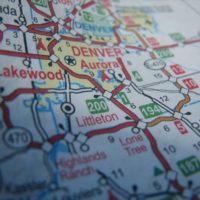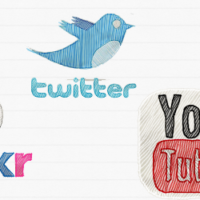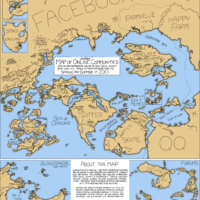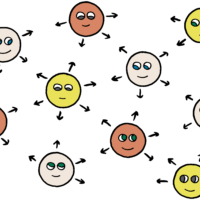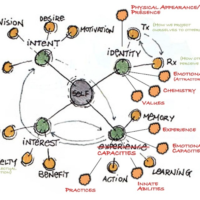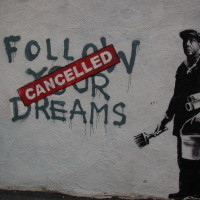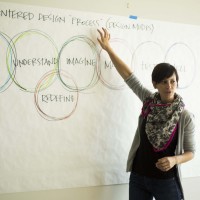The Knight Foundation recently shared the results of a 3 year study, "Soul of the Community" (SOTC) looking at what factors played a role in 'attaching' residents to their communities. This study focused on the definition of community as tied to a specific geographic location, investigating what make people love where they live. ArtPlace America also defines 'community' as inherently place-based in their 4 principles of successful creative placemaking: Define a community based in geography, such as a block, a … [Read more...]
Community development in the age of social media
Today, more than ever before, artists, individuals, and organizations are using social media to make connections and spark conversations with each other. Art even happens online. Community building does too, according to this article on The Guardian. From mobilizing communities to act to providing a space for conversation and connections, social media is increasingly being used to support and sustain communities, in-person and away from computer screens. Do you see crossover between your online, social sphere and in-person action? How can, or … [Read more...]
Near, Far, Wherever you are
Do communities have to be tied to geography? Locality? Your Youtube Cat Video Appreciation community might have something to say about that. Social media allows us to connect with people from geographic communities both near and far. Distance is no longer a barrier to people who have common interests, passions, or projects! Explore the wide, wild world of online communities through this fun, interactive map from XKCD. … [Read more...]
Choosing the path
Over on her ArtsJournal blog, Jumper, Diane Ragsdale examines the means versus ends issue discussed by Lyz Crane in our last blog post. The question of whether the arts can truly contribute to community building is still widely debated. She concludes that the path between the two does not have to split, and that arts organizations have long worked to use arts and culture to bring people together. What are your thoughts? … [Read more...]
Arts as Ends, Means, and Everything In Between
ArtPlace America, "works to position arts and culture as a core sector of comprehensive community planning and development." In this article, Lyz Crane, Deputy Director of ArtPlace America, dives into the field of arts-based community development - from the practitioner and researcher point of view. She showcases how many stakeholders can work together to create sustainable communities and reflects on the different terms we use to talk about community, the arts and community development: culture-based development, artist space development, … [Read more...]
Why the arts?
How do the arts fit into the many definitions of community? Creative Community Fellows alumna, Director of Art in Praxis and Interim Director of the Bromo Arts District, Jess Solomon shares her perspective in conversation with Marty Pottenger, artist and director of Art at Work. Both artists reflect on the increase of artists who work within communities, and on the unique role that art can play in strengthening and supporting communities: "Art has always been used to make things better, to inspire people, to bring people together. But … [Read more...]
An invitation
Like people, communities are complex. Communities are not only defined by location, but also by human relationships and needs. In "A Model of Identity and Community", David Pollard shares consultant Aaron Williamson's definition of the four essential elements to a community: he states that communities are groups of people who come together based on shared intent, identity, interest, and experience/capacities. Pollard also addresses the challenges of building community. Communities, he states, self-organize. Nobody can create a community, … [Read more...]
Communities, Complexities and Commonalities
What does community mean to you? What are the most important aspects of a community? In this Stanford Social Innovation Review article, David Chavis and Kien Lee discuss many of the elements that are key to community: location, meeting common needs, a sense of safety and belonging, and a shared history. They also point out the complex nature of communities: "When a funder or evaluator looks at a neighborhood, they often struggle with its boundaries, as if streets can bind social relationships. Often they see a neighborhood as the … [Read more...]
You’re Among the Greats
The next time you fail, you will know that you are never alone. You’re among creative individuals like Toni Morrison, Perry Chen, Sarah Kaufman and countless others. Take a look at this amazing issue of NEA Arts Magazine on “The Art of Failure.” As we have illustrated on Field Notes this week, it is an art, one that you can practice and eventually (sort of) master. Remember to reflect, learn, and lead through failure. We'll be tuning back in next week with failure stories from the field. Don't miss it. “Ever tried. Ever failed. No matter. … [Read more...]
Being a Team Leader
Failing sucks. It can be a difficult time of navigating emotions, goals, and setbacks. Now, picture how much more difficult it is to guide others through a failure. We're sure that many of you don't have to let your imagination run too wild. You've probably been there. This is something leaders do constantly. Leading a team through failure is more difficult than a single individual, as different people have different reactions. This Harvard Business Review article gives clear instructions and motivations for leaders to help guide their teams … [Read more...]
A Design Thinking Frame of Mind
When you’re watching things go down in flames or they've just collapsed in front of you, it can be hard to keep a broad perspective and focus on moving forward productively. This article by Miriam Persley at Leadership Learning Community (which references Beth Kanter from our post yesterday as inspiration) provides a twist on a design thinking framework to give us a practical list for working through failure, in a healthy way: Gain Empathy: Reflect Gain Empathy: Dig Deeper Reframe: Infer Insights Reframe: Set A … [Read more...]
C’mon Celebrate!
Even when you’re in the middle of a sticky situation, it’s possible to find the humor in your predicament and change perspective. Although not all failures are productive, in fact, we’d reason to say that none of them are necessarily productive, there is still reason to celebrate! Writer Gwen Moran shares in Fast Company that by responding to failure with empathy and humor, you can foster a creative culture. Even if a setback gets you down, Gwen shares that it’s important to encourage a supportive environment at work to build trust and turn … [Read more...]
On Failure and Fun
In this video, Beth Kanter, discusses the prominent resistance to using failure in the nonprofit sector to our benefit or as a learning mechanism. It is helpful to move out of a ‘fixed’ mindset into a ‘growth’ mindset in order to use failure in a productive way. Rather than fixating on a tough situation, think about it in terms of growth! By being open to growth and change, you can use failure as an opportunity to improve. It takes some practice to get into this mindset though. Our first reactions to failure are typically negative. Beth … [Read more...]
When You Might Want to Worry
It’s day four of our journey in the land of failure. To date, the news has been fairly positive, if not supportive. It has focused on the celebration, the motivation. As with everything in life, it is important to balance the bad with the good. Moderate your acceptance of failure with the knowledge that not all failure is good. This article in the Harvard Business Review by Art Markman makes this important distinction between a ‘good’ failure and a ‘bad’ failure. Occasional failure is ok, but systematic failure means you have a real problem. … [Read more...]
Leading Change
“How can we do it better and should we even be doing it in the first place?” Does your organization look the same as it did five years ago? What about your creative practice? As individuals and organizations, we are constantly changing. We change because we encounter new ideas and recreate old ones. We think critically about how we are working and how we can make it better. But, change can be hard. Heck, change is hard. Fear of failure relates to fear of change. Aaron Dworkin, Dean of the University of Michigan’s School of Music, Theatre … [Read more...]

